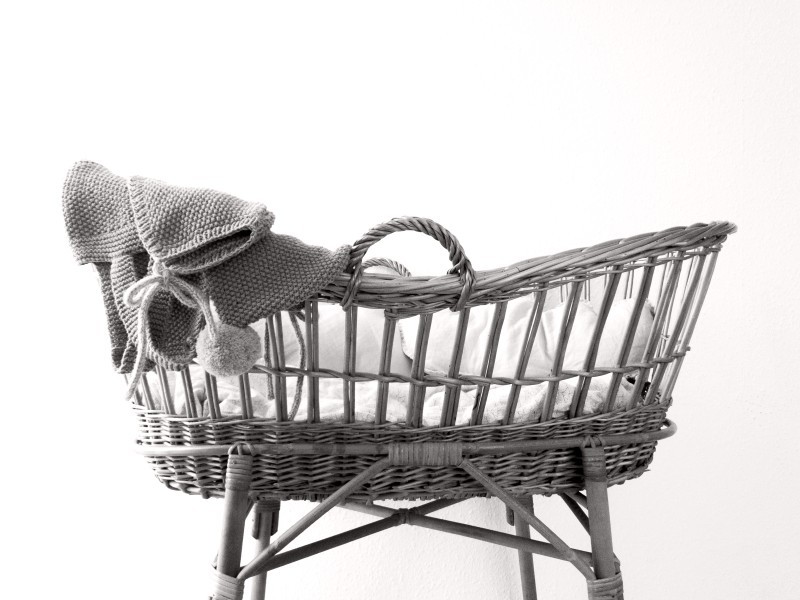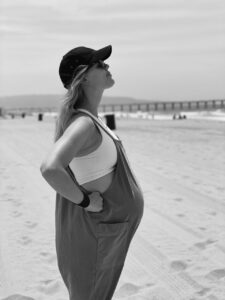
This week, we are sharing BAHS Senior Placement Specialist Katherine Patterson‘s essay on her journey to motherhood. We are deeply grateful to Katherine for sharing her story of pregnancy loss, vulnerability, hope, and resilience with our community. We hope it can help other women out there to feel less alone as they face similar struggles.
Like many millions of women, I am 1 in 4. I’m part of a club that’s inadvertently oversubscribed, even though members include the likes of Lily Allen, Jools Oliver, Michelle Obama, Chrissy Teigen and Meghan Markle, to name a few. It’s as unexceptional as it is indiscriminate, brazenly disregarding age, social status, religion, race, ethnicity, creed or other. In spite of this, the subject remains taboo, and the prevailing expectation is that women will endure the experience quietly, stoically…Behind closed doors.
Though my story is one of so many, my hope is that by sharing it, and transparently contributing to the dialogue, other women might feel less alone and more empowered on their own fertility journey, whatever this looks like, and wherever miscarriage features along the way.
I was 36 and this was my first deliberate attempt at conception. After many years of feeling quite indifferent about the prospect of having children, something shifted in me, and the idea of having my own little family was suddenly very appealing (cue: my mother’s gargantuan sigh of relief). Inevitably, I had no benchmark to work with in terms of what felt “normal”, but the experience was almost immediately very challenging for me on so many levels, by my standards.
Pregnancy is an odd, compartmentalized journey. The unwritten rule of thumb is to keep the news to ourselves until we reach the end of the First Trimester, even though that First Trimester is often the most difficult in many ways. And then society has standardized the notion that it’s only appropriate to share the news if it’s good news. Those early weeks are a lonely paradox – your pregnancy isn’t yet medically deemed “viable”, but you’re no longer who you once were pre-pregnancy either, which is only accentuated by the myriad of do’s and don’ts that shape your new normal – your diet, exercise regime, and general habits all look very different now. And you might also be navigating some rather unpleasant symptoms. I’ll get to that.
It can feel like you’re trapped in-between two worlds for what seems like an eternity. And if you’ve not shared your pregnancy with anyone, you have no support system in the event that things don’t go as planned. Too many women have to muddle through a kind of solitary bereavement that’s so difficult to rationalize to the outside world, because there’s often nothing “tangible” to show for it.
I generally regard myself as fairly hardy. Perhaps it’s my “British stoicism”, but I tend to push through pain and discomfort without complaint. I think I met my match with pregnancy. I was crippled by “morning” sickness (all-day, any-time-of-the-day sickness in my case, as most pregnant women can relate to), and seemed to be constantly, irrationally, and inconsolably sad and irritable. My brain was foggy. My body ached. I couldn’t seem to stomach anything with any nutritional value, so I was starting to feel the effects of a poor diet as well.
I remember sitting in my doctor’s office, tearfully begging her to tell me why this was all so hard. Hormones and luck of the draw, it seemed. Her delivery was cursory, and I felt like such a wimp, duped by all the blissful early pregnancy images I’d consumed until now on social media – manicured hands cupping nascent bumps, curated backdrops, DIY placards, ultrasound scans and blithe, sunny hashtags. I couldn’t relate to any of it – most of the time I could barely peel myself out of bed. Still, I was acutely mindful of how lucky we were to have conceived naturally as quickly as we did, especially given that I was over 35 (otherwise known as high risk and “Advanced Maternal Age” in the medical field).

I switched gears, finding solace in what few authentic accounts of not-so-instagrammable pregnancy experiences I could find online. They were the trailblazers – creating raw, authentic and contentious content before it was deemed culturally progressive, and before they were commended for doing so – no matter the likes, follows or lack thereof. I’ll always be grateful for these women, all of whom I follow to this day. Now, of course, they’re in very good company.
My 12-week scan finally came, and I could not have been more ready to reach the glittery milestone. Things started off normally enough. My husband and I were cautiously hopeful; aware of the statistics, but refusing to entertain them in that moment. As fate would have it, our optimism was futile, as illustrated by the expression on our OB-GYN’s face as she desperately attempted to pick up a heartbeat we’d never come to hear. She adjusted herself uncomfortably. The measurements were all off. “Could we have got our date of conception wrong?” No. “Were we sure?” We were. As her efforts to encourage movement from the tiny, lifeless bubble on the screen grew ever more frantic, I felt a wave of resignation wash over me. When she finally articulated the inevitable, my response was perfunctory and guarded, which took even me by surprise. I was too proud to burden her with my heartache, and I was utterly ashamed that my body, which I determined was obviously broken, had failed at what it was biologically designed to do. We were told there’d been no growth beyond 7 weeks – this meant that there had been no heartbeat for over a month. Known as a “Missed Miscarriage” or “Silent Miscarriage”, I wondered how I hadn’t noticed – shame on me for not instinctively sensing something was wrong, as any decent mother surely would have. In truth, there are no symptoms, and women often continue to experience signs of pregnancy. And so, just like that, this is where our journey ended – my little bubble and I.
The pressure to navigate next steps was hurried and transactional. The only options available (natural/expectant, medical or surgical) were limited, but no less overwhelming. I was advised almost immediately that the surgical route was “the most popular”. Being coerced into moving on so quickly after having invested a quarter of a year attempting to nurture a life inside my body, which had been no mean feat, was jarring. It would only take 15 minutes before I could, ostensibly, go about my life again. We might as well have been talking about a lunchtime beauty treatment. I didn’t know how to rationally digest any of it. I wasn’t ready to.
This silver bullet they were so fervently encouraging (known as a Dilation & Curettage, or a “D & C”) also happened to be the most invasive and most expensive option on the table. While I understood its appeal as an accelerated return to normalcy (and boy was I ready to feel normal again), the associated risks (uterine scar tissue, cervical lacerations, uterine perforation etc.) were non-negotiables for me, however rare. I was extremely lucky that this route was not considered a medical necessity for me.
May every woman have agency over their body in the event of a miscarriage. If there’s no medical reason to expedite the process, women should be provided adequate time to consider their options and arrive at an informed, intentional decision, especially when they are, arguably, at their most vulnerable, as I was.
To be one thing one moment (that you so desperately want to be), then the antithesis of said thing just moments later, is very discombobulating. I needed time to adjust. To grieve. Like all the other women who’ve unwittingly wound up on this path, I walked in a mother-to-be and walked out a statistic, prescription in-hand. The tiny bump I so proudly donned was now an affliction, rather than a miracle. I left the building as quickly as I could, head down, trying to un-see all the burgeoning bellies and smiles that peppered the waiting room. I felt like I was in a life-size game of Snakes and Ladders – I’d almost graduated to the Second Trimester, but I landed on a snake, and wound up all the way back at square one. I was damaged goods, or so it felt. No longer a prospective cash cow for the medical system that seemed so intent on making the next stage of the process so unnecessarily difficult and traumatic.
Knowledge is definitely power. I knew no one would advocate for my body better than me, so I dived into the labyrinth of cyberspace. I had not anticipated that this would unearth a systemic failing in the way in which miscarriages are managed in the US. Put simply, if you decide to manage your miscarriage medically (as I did, at least to start with), then you should be prescribed a combination of 2 drugs – Misoprostol and Mifepristone, as recommended by the American College of Obstetricians and Gynecologists (ACOG) *, who state that the combination of the two drugs is “significantly more effective” than taking Misoprostol alone. However, Mifepristone’s association with, and use in the treatment of, medical abortions means its availability is limited and many emergency rooms, primary care or prenatal clinics are not permitted to dispense it. It’s also expensive. This translates to the potential for a less effective outcome, which I experienced first-hand.
To be clear, I was prescribed only Misoprostol, twice, and experienced an excruciating “Incomplete Abortion” on both occasions. At this point, I fired my OB-GYN, who was now heavily insistent I undergo a “D & C”. I re-connected with my previous OB-GYN, who I’d have chosen to deliver our baby if we hadn’t relocated. I received her professional blessing to let nature take its course (known as “Expectant Management”). No more meds. No more pain. Just trusting in the process and knowing I was safe, and that my body was intrinsically, instinctively capable of navigating this at its own organic pace. And that it did.
When I was finally ready to share my experience, friends and family were understandably sad to learn I hadn’t confided in them. It made me realize how important it is to allow people to support you – it’s the true essence of any relationship. In fact, my confession was met with a shocking number of “me too’s”. Tragically, one friend said she hadn’t wanted to “inconvenience” anyone with her grief, especially since the world was already so preoccupied with the Covid pandemic. It pained me to think about how many other women have endured the same experience alone, whatever the reason.
Of course, we all grieve differently. Publicly unpacking emotional trauma can be anything but a means of catharsis for some, especially as it pertains to miscarriage, which seems to be one of the most ubiquitous elephants in the room. But it’s everyone’s prerogative if we normalize the narrative and banish the abominable associated connotations of shame, failure, and guilt.
Perhaps we can eventually even address the term itself – “miscarriage” – a veritable misnomer with a prefix (mis) that implies blame. As if women have even a modicum of control over the outcome. Language matters – we definitely deserve more respectful, more accurate terminology.
Now, almost 18 months on, it’s obvious we’ve turned a corner. Social media and society as a whole are finally starting to embrace “real” motherhood. For the first time, a growing number of celebrities (men included – most notably, Mark Zuckerberg and James Van Der Beek) are leveraging their influence online and shedding the filters on their habitually flawless lives. In sharing the harder parts of the reproductive journey and validating both the ups and downs in equal measure, this is empowering mothers and fathers the world over, to follow suit. Inevitably, it’s still too raw and uncomfortable for some, but the hashtags are gaining traction, and there have never been more resources, support, and honest accounts of the more challenging aspects of pregnancy, and pregnancy loss, as there are now.
To whoever needs to read this – as the statistics corroborate, if you experience a miscarriage, you are very far from alone. Your body is not broken and there is nothing you could have done/ said/ thought/ eaten or other, differently, to change the outcome. It’s. not. Your. Fault.
It’s also totally normal to struggle with the associated symptoms of pregnancy. It’s not always plain sailing. You might want to complain about it – I know I did. This doesn’t make you any less deserving of the pregnancy itself. It makes you human. Finally, consume social media content wisely – this can be applied to anyone, pregnant or not. Social media is not, for the most part, real. Your journey will be unique to you. Let it be beautifully so.
Ultimately, sharing not just the highs, but also the lows, begets relatability, authentic connection, and solidarity. Our shared struggles are the glue that holds us together, if we only allow them to. I’m all for it.
As I write this, half-way through the Third Trimester of my “Rainbow Pregnancy” (without any of the gnarly pregnancy symptoms I experienced before, might I add!) it seems most fitting to close with one of my favorite quotes:
“Everything will be ok in the end. If it’s not ok, it’s not the end.” – John Lennon
Related Blog Posts
Introducing Sarah Rueven, Founder of Rooted Wellness
National Infertility Awareness Week
Meet Gail Sexton Anderson, CEO & Founder of Donor Concierge
